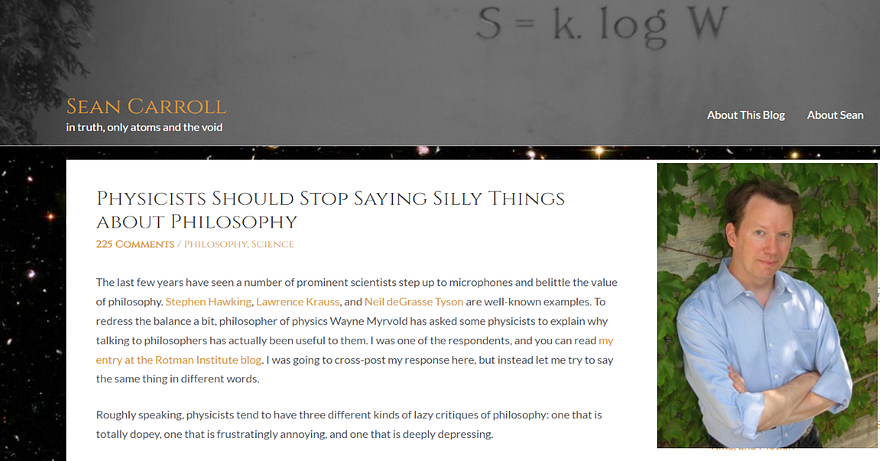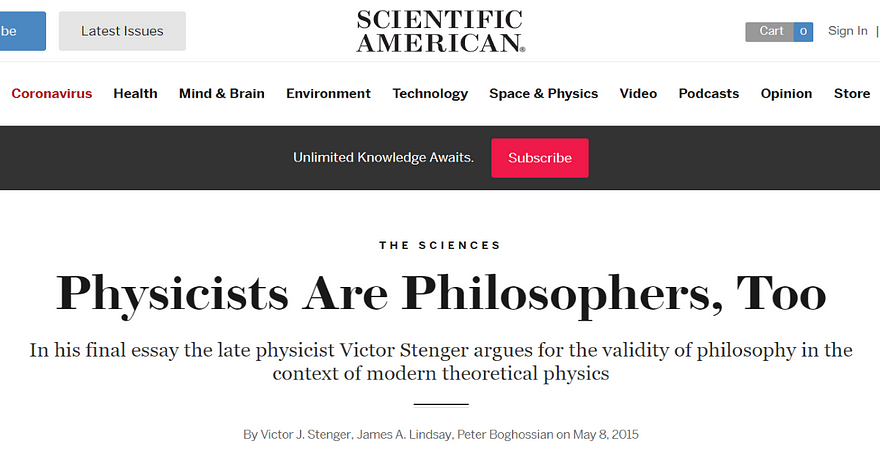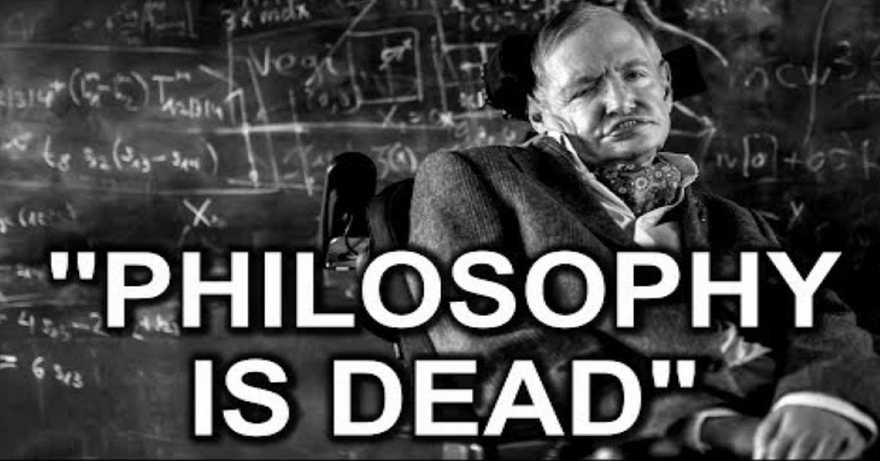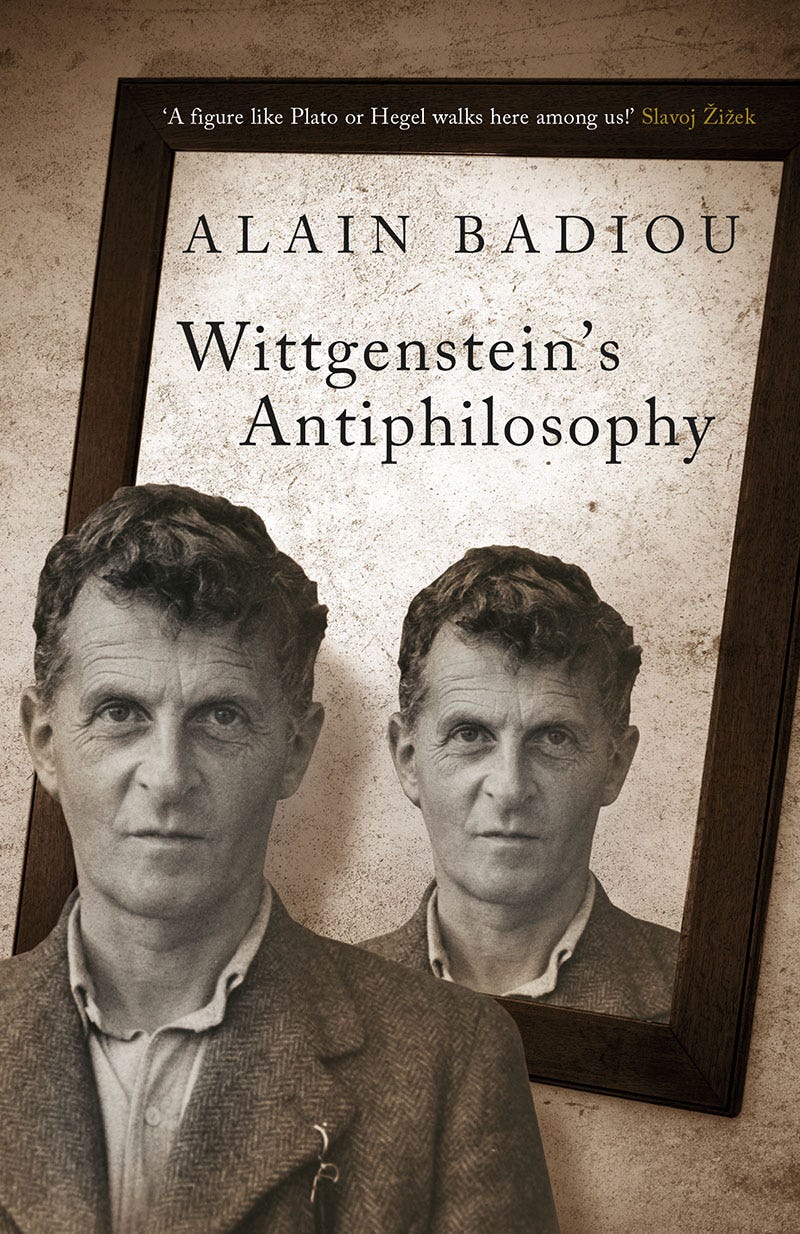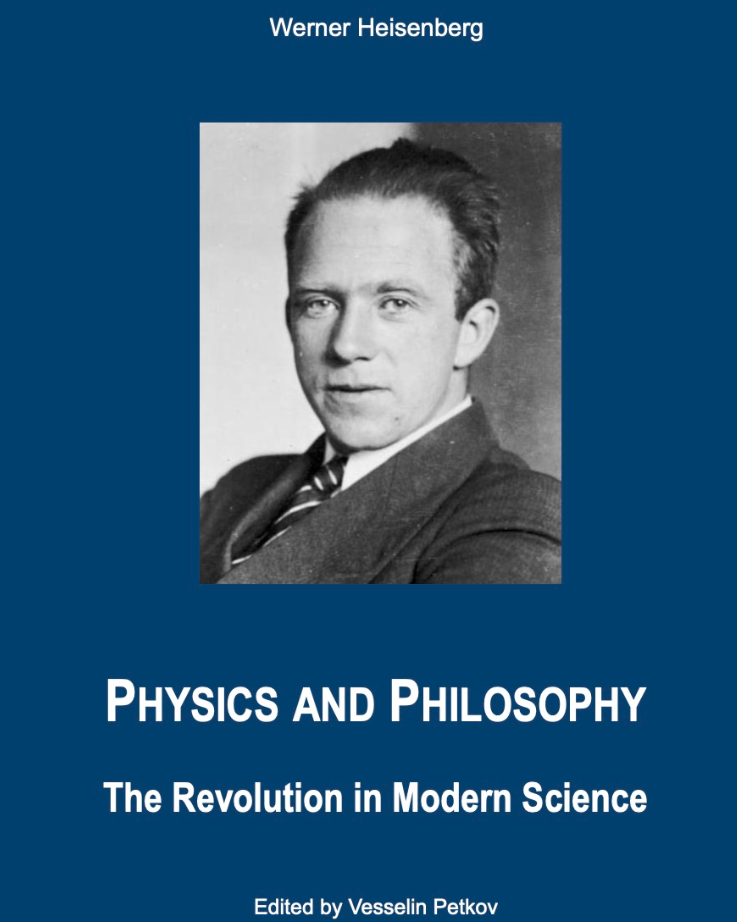Some readers might have noted the multitude of memes on social media posted by the advocates of spirituality, New Ageism and idealism which include the words of famous quantum physicists. So what’s behind this interest in these selected physicists?
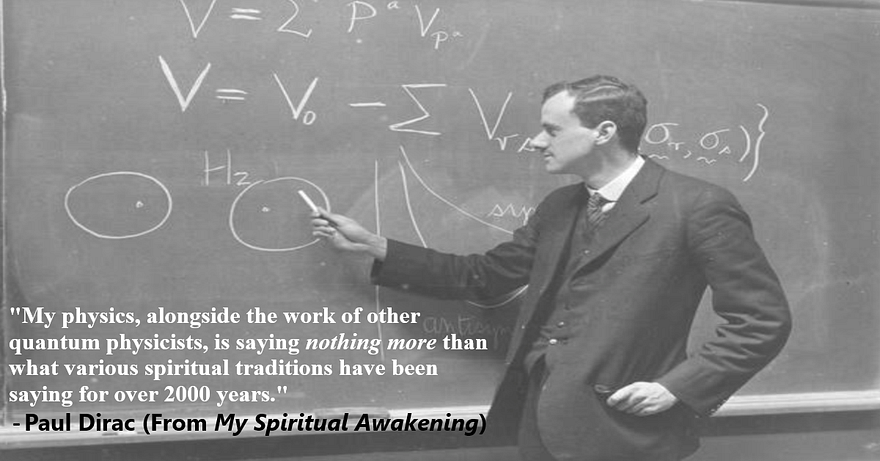
“Science does not need mysticism and mysticism does not need science, but man needs both.”
— Fritjof Capra, from his The Tao of Physics
The users of Facebook and social media generally might have noted how often “spiritual idealists” (see here) and New Agers quote a handful of passages from German and Austrian physicists spoken (or written) in the first three decades of the 20th century… Or at least those who’re interested in philosophy and science might have noted this.
[See the section on the term “New Age” after this.]
The artfully-selected words of these artfully-selected physicists are quoted to back up various spiritual and (rather less so) philosophical positions.
It’s also worth stressing here that often such physicists are either misquoted or their words are simply made up by the memester. Indeed, when I checked some of these passages, all I could find were other out-of-context quotes of the very same words — without any references or sources.
So New Agers, etc. have created multiple images (or memes) with the words of these physicists embedded within them. The passages quoted are always the same ones. Indeed they’ve been used countless times by such people.
These passages are usually very short — often little more than a single sentence. And, as ever, they’re taken completely out of context.
All this quoting of physicists is usually (or even always) done for one reason and for one reason only:
To advance various spiritual and/philosophical beliefs (often about “cosmic consciousness”).
So spiritual idealists, “anti-materialists” and New Agers often quote and mention various physicists from the early 20th century (as well as beyond) to back up what they already believe anyway.
In other words, when you look into this, it can quickly be seen that virtually no contemporary New Ager, spiritual idealist, etc. became spiritual as a result of his or her research into quantum mechanics or, say, from reading the technical works (i.e., in papers, etc.) of Erwin Schrödinger. Instead, what nearly always happens is that such people became spiritual for exclusively personal reasons — and only then did they look to these physicists for scientific backup.
So most New Agers, etc. have no interest in science (specifically quantum mechanics) other than as a means to advance their spiritual and philosophical beliefs. (Beliefs they held long before encountering the work of these physicists.) This, then, is a kind of argument from authority (or appeal to authority) which basically amounts to the following claim:
If Heisenberg, Schrödinger, Planck, Bohm, etc. believed and said these things, then they simply must be true.
The other point worth making is that although a tiny minority of physicists did say these things (although, as stated, they’re often either misquoted or the quotes are literally made up), these scientists rarely went into much — or sometimes any — detail. More importantly, they rarely made an effort to tie their non-scientific words to their actual physical (i.e., technical) theories. Indeed Erwin Schrödinger, for one, went out of his way to disconnect his interest in (loosely called) “eastern philosophy” from his actual technical physics. (See Walter Moore’s excellent biography: Schrödinger: Life and Thought. Moore goes into much detail on Schrödinger’s interest in Schopenhauer, Vedanta, etc.)
New Agers, on the other hand, do the opposite of this.
Such people go out of their way to connect quantum physics (as well as much else in science) to their prior spiritual and philosophical beliefs.
So why these particular German and Austrian physicists?
One reason for this is that from (roughly) the 19th century (particularly from the period of Arthur Schopenhauer’s strong influence on German and Austrian culture as a whole) to the first three decades (or less) of the 20th century, eastern philosophy (this term, like so many, is disputed) was popular among artists and intellectuals in both Germany and Austria. Thus, these physicists simply reflected the general intellectual milieu and culture of their time. Indeed, as they got older, they often stopped referring to such things…
That said, most of these oft-quoted physicists hardy referred to eastern thought in the first place. Hence the very-few passages which spiritual idealists, New Agers, etc. have access to.
New Age?
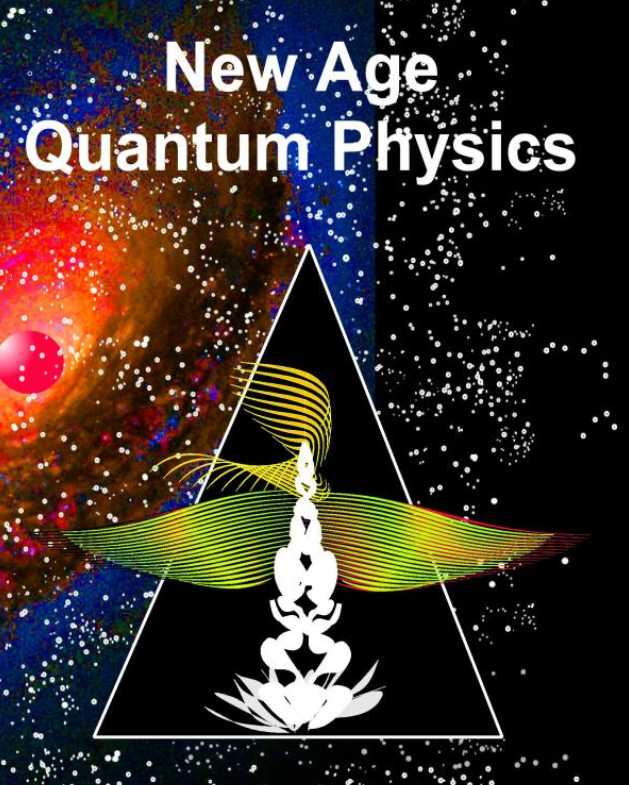
The word “New Age” was used throughout the section above. Admittedly, that was largely for convenience’s sake. So it is, indeed, an umbrella term.
Some academics say that the New Age movement is “dead” and that the term itself is “useless”. Other academics say that this movement is “very much alive” and that the term is still useful.
For example, a professor of religious studies, Hugh Urban, wrote:
“According to many recent surveys of religious affiliation, the ‘spiritual but not religious’ category is one of the fastest-growing trends in American culture, so the New Age attitude of spiritual individualism and eclecticism may well be an increasingly visible one in the decades to come.”
So take your pick on whether New Ageism is alive or dead.
At one point in history, New Agers used the term “New Age” themselves — a hell of a lot. Roughly between the 1930s and 1960s, various individuals and groups talked about a coming “New Age” and often used that term (see here). Then, when critics picked up on both the movement and the term itself, many (though not all) New Agers stopped using it.
New Ageism can even be dated back to the 19th century. Historian Wouter Hanegraaff, for one, wrote the following:
“Most of the beliefs which characterise the New Age were already present by the end of the 19th century, even to such an extent that one may legitimately wonder whether the New Age brings anything new at all.”
More relevantly, many New Agers believe in what they call “holism”. They also believe that a “divinity” (or simply consciousness) pervades the universe. This leads — for various reasons — to New Agers rejecting “traditional religion” and the “monotheistic God”. New Agers, instead, emphasise the individual (or “self”) and their own “spiritual authority”.
Most New Agers also reject some (or all) of the following: materialism, rationalism, the scientific method, empiricism, etc. However, that doesn’t stop them from also using concepts and terms from science and particularly from what has been called the New Physics. In the later respect, New Agers often mention David Bohm and Ilya Prigogine. All this has also largely been down to Fritjof Capra’s The Tao of Physics (1975), as well as Gary Zukav’s The Dancing Wu Li Masters (1979).
Finally, if you reject the spiritual and philosophical claims of New Agers, they will often accuse you of being “dogmatic”, “old-fashioned” and state that, for example, materialism is a 19th century philosophy. (A small number of New Agers use the words of Werner Heisenberg to back this claim up. See my ‘Was Quantum Physicist Werner Heisenberg an Idealist?’.)
Now for some examples of the appropriation, annexation or commandeering of the words of physicists by New Agers, spiritual idealists, etc.
Deepak Chopra and Bernardo Kastrup
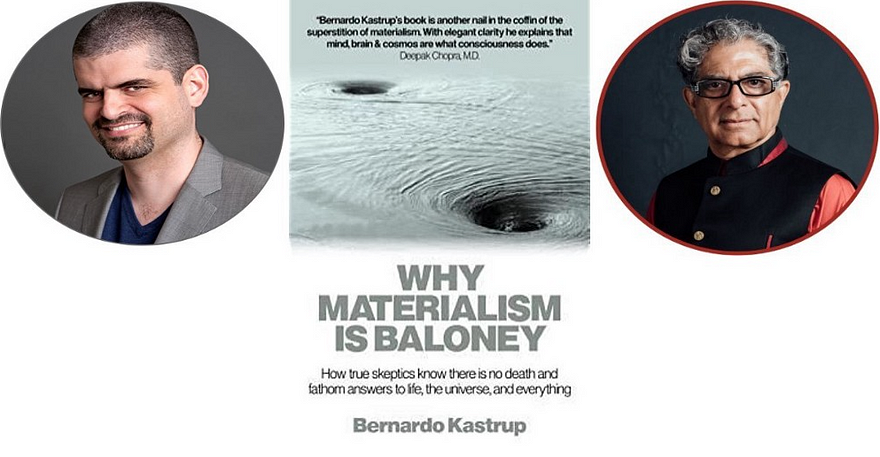
Take these words from the spiritual idealist Deepak Chopra:
“The possibility of a mental universe has a strong lineage going in the quantum era, but present-day physicalists (physicists who accept the physical nature of reality as a given) feel free to dismiss or ignore figures as towering as Max Planck, Werner Heisenberg, and John von Neumann.”
Now take these words from an idealist (see here) who believes that he has (to use his own word) “proved” that heaven exists (as in his book, Proof of Heaven) — Dr Eben Alexander. He wrote:
“We live in a mental universe, projected out of consciousness, just as Heisenberg realized [].”
More technically, we also have the idealist Bernardo Kastrup’s long and wild jump from Werner Heisenberg’s stress on measurements to his very own “transpersonal mind” (see the ‘transpersonal movement’). As Shawn Radcliffe writes (in a website called Science and Nonduality):
“For Kastrup and his colleagues, these types of measurements [in quantum mechanics] can only be performed by a conscious observer. They write that inanimate objects like a particle detector can’t truly measure a particle. With the double-slit experiment, ‘the output of the detectors only becomes known when it is consciously observed by a person,’ writes Kastrup. Extending this to all of reality, he argues that a ‘transpersonal mind’ underlies the material world.”
A large part of all this (scare-quoted) “interest” in quantum physics boils down to the rejection of what spiritual idealists and New Agers often call “materialism”.
Take Bernardo Kastrup again and his broad sociological and political take on materialism. Kastrup wrote the following words (as taken from his book Materialism is Baloney) on materialism:
“A big part of the motivation for our culture’s current embrace of materialism is the observed regularities according to which reality seems to unfold.”
[It can be taken as given here that Kastrup means Western culture by “our culture”. That is, he means European, British and American culture.]
So clearly it isn’t just getting the metaphysics of “reality” right which concerns Kastrup and other self-styled “anti-materialists”. Kastrup is also concerned with what “our culture embrace[s]” and the fact that it (in his eyes) embraces materialism. And that may at least partly explain Kastrup’s words “materialism is baloney”; as well as Deepak Chopra’s similarly intemperate remarks on materialism.
It’s worth noting here that some spiritual idealists can be very vain, egotistical, aggressive and intolerant. New Agers also often conflate materialism with consumerism, rather than seeing materialism as a metaphysical position. So it’s odd that many New Agers are perfect consumerists who also consume large amounts of New-Age merchandise.
But is “our culture” really materialist?
The fact is that there are big chunks of our culture that certainly do not embrace materialism — from the large numbers of religious and “spiritual” people, to New Agers, to the lovers of the arcane. Now add to that the many political activists and political theorists who do not embrace materialism. And, last but not least, take on board the many idealists, realists, spiritual-but-not-religious people, etc. who’re strongly against what they describe as “materialism”. (See ‘Spiritual but not religious’.)
So our culture — at least as a whole — clearly does not embrace philosophical materialism. That’s unless Kastrup simply means that everyone in our culture unconsciously embraces materialism by osmosis or that most folk just catch it in the air. (This would be Kastrup’s very own version of the notion of “false consciousness”.)
In any case, the fact that Kastrup and other idealists believe that our culture does embrace materialism may well also explain why they (rhetorically) claim that the commitment to (philosophical) materialism is based on “faith” or even that materialism is a “religion” held (it seems to them) by literally dozens of millions (or more) of people.
*************************
Part Two: Comments on Specific New-Age Memes
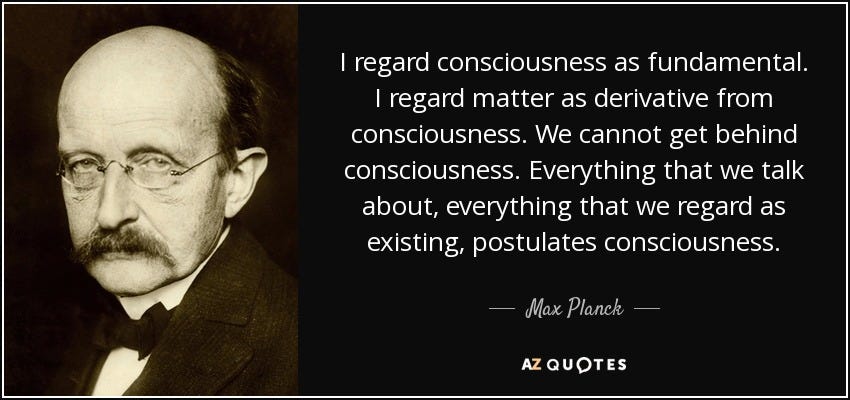
Max Planck’s words (in meme form) are posted all the time on Facebook and social media generally. It’s even possible that they are fake. Or, if not fake, then doctored to some extent… But perhaps not.
That said, there is nothing spiritual or even idealist about Max Planck’s words. The stress on consciousness (or mind) is similar to the stress on experience (or sense impressions). This is largely an empiricist position which dates back (in various strong or weak forms) to the ancient Greeks and which achieved an historical importance with the British Empiricists of the 18th century.
So, of course, everything we gain access to is done through our minds — or through “consciousness”. We have no other access to the world. However, empiricists, realists, materialists, etc. believe that too. So it’s what is derived from that which is important. And idealism — let alone spiritual idealism — is simply a single option. What’s more, it’s a position which Max Planck himself almost certainly didn’t uphold.
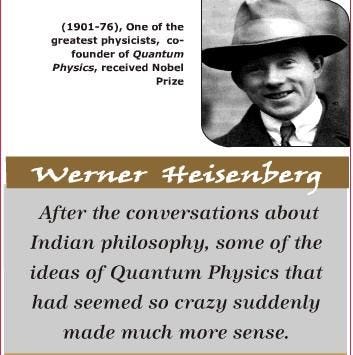
Is this a genuine quote? As ever, when I Googled this passage, all I could find was other out-of-context quotes (most in images or memes) of the very same words — without any context, references or sources. But I did find the following from Werner Heisenberg:
“The kinship between the ancient Eastern teachings and the philosophical consequences of the modern quantum theory have [sic] fascinated me again and again.”
If this claim is genuine, then it seems to be an acknowledgment that quantum mechanics came first (or at least Werner Heisenberg’s own work came first) and only then were there these “conversations about Indian philosophy” carried out. That said, anything can be connected to anything. It also seems that Heisenberg was saying that Indian philosophy may simply be of some help when it comes to understanding quantum physics. And so too is learning some mathematics. In addition, metaphors and analogies are often (very often) used when discussing quantum mechanics.
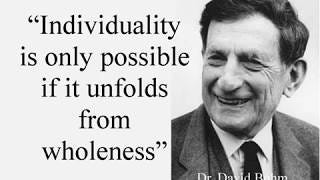
That probably is a genuine quote from David Bohm. However, it has very little to do with his actual physics. That is, it has little to do with Bohm’s technical physics as expressed in his papers. Sure, it may have something to do, on the other hand, with his interpretations of his own work.
It can be accepted that, like many other intellectuals, Bohm did read Indian religious texts, etc.
Apart from that, the passage above reads like a poeticism, not as science or even as philosophy.
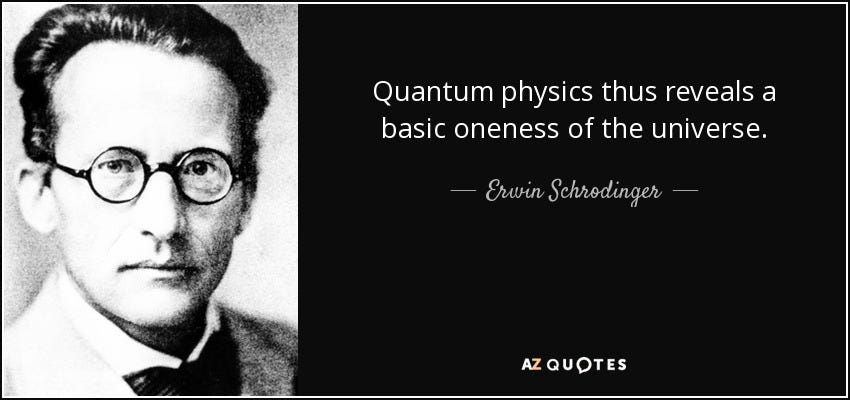
Erwin Schrödinger’s words are, again, basically poetic.
So the passage above can be read as being as statement exclusively about nature’s fundamental laws, constants, forces, etc. and the omnipresence of energy. Or, alternatively, it can be read in an exclusively spiritual or idealist way. Whichever way it is read, the statement itself doesn’t belong to physics — quantum physics or otherwise.
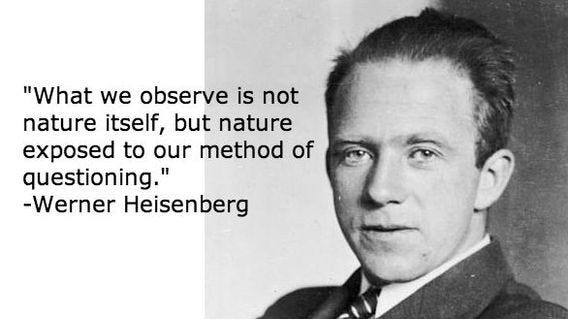
This passage is also often quoted. It’s a basic statement of one aspect of the Copenhagen interpretation of quantum mechanics.
It’s very hard to see why it’s spiritual or even idealist in content. So it can only be supposed that the reasoning is the following:
If nature depends on human observations and human questions, then it must also depend on minds (or on consciousness). Thus, surely nature itself must be mental (or constituted by consciousness).
Of course this is bizarre. But this is a good way of making sense of why this passage is quoted so many times by New Agers, spiritual idealists and anti-materialists.













